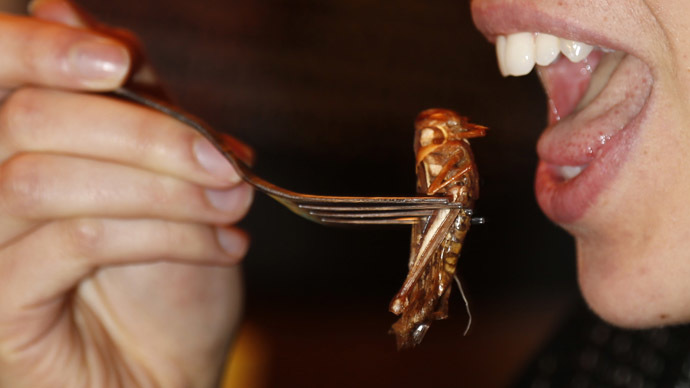Bug burger anyone? Insect-based grub could hit Swiss groceries next year

Next year, insects might be on the shelves of Swiss grocery stores alongside Switzerland’s national sausage, mustard and cheese, after the Federal Food Safety and Veterinary Office suggested commercializing crickets, grasshoppers and meal worms.
On Monday, the Swiss Veterinary Service endorsed the sale of the three species as part of a planned revision of law regulating food stuffs, reported the ATS, the country’s national news agency.
In 2014, the Swiss authorities promised to put edible insects on the market following a food-from-bugs tasting organized by Isabelle Chevalley (member of the National Council of Switzerland) for her fellow MPs.
Apéro insecte:Ce fût une super découverte pour beaucoup de mes collègues. Je suis ravie de les avoir sensibilisés à cette cause écologique.Posted by Isabelle Chevalley on 10 Март 2014 г.
The menu included burgers with meat produced from mealworms, rissoles made from crickets, grasshopper chocolate biscuits and meal worm lemon cakes. Believe it or not, these delicacies tickled the MPs’ taste buds.
READ MORE: Can of mealworms: Belgium starts selling products made with insects
“It was a great discovery for many of my colleagues. I am delighted they recognized its environmental benefits,” Isabelle wrote in a post on her Facebook page on March 11, 2014.
“It doesn’t differ from a classic burger at all!” said counselor Robert Cramer, biting into a bug-burger.
“It tastes delicious,” said Maya Graf, president of the Swiss National Council, chomping on a cricket-rissole.
Edible insects contain high quality protein, vitamins and amino acids, according to the US Food and Agriculture Organization. “Crickets need six times less feed than cattle, four times less than sheep, and twice less than pigs and broiler chickens to produce the same amount of protein,” its website points out.
As a result, bugs are viewed as a potential source for the production of protein-rich food.
Insect meal has potential as a future animal feed, #UNFAO study finds: http://t.co/FKfZYMty0W
— FAO Newsroom (@FAOnews) November 12, 2014
The UN’s Food and Agriculture Organization issued a 200-plus-page report in May, 2013. It gave the first comprehensive assessment of insects' current and potential uses as food for humans and livestock.
"It is widely accepted that by 2050 the world will host 9 billion people. To accommodate this number, current food production will need to almost double," reads the report. "We need to find new ways of growing food."
Within the EU, bugs have not yet been officially approved as a source of food, although stores in some EU countries, such as Holland and Belgium, have been selling bug-enriched grub.
2 bn people eat edible #insects. Find out where & nutritional values http://t.co/149EPQtjOupic.twitter.com/ewKZDRJVxX@VantommePaul@FAOnews
— EU Expo 2015 (@EUExpo2015) April 22, 2015
The European Commission “is working on a new proposal on novel foods. At some point it could facilitate placing on the market food from new sources, for instance insects,” said Vytenis Andriukaitis, a health and food safety commissioner, at the EU Food Innovation Summit in February 2015.












